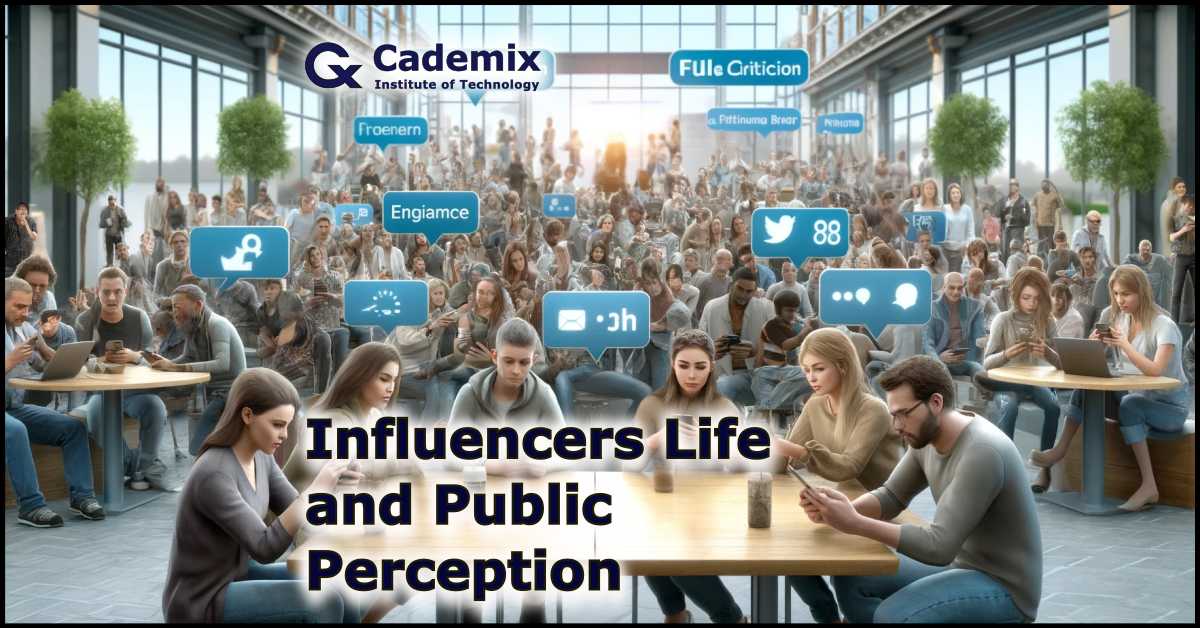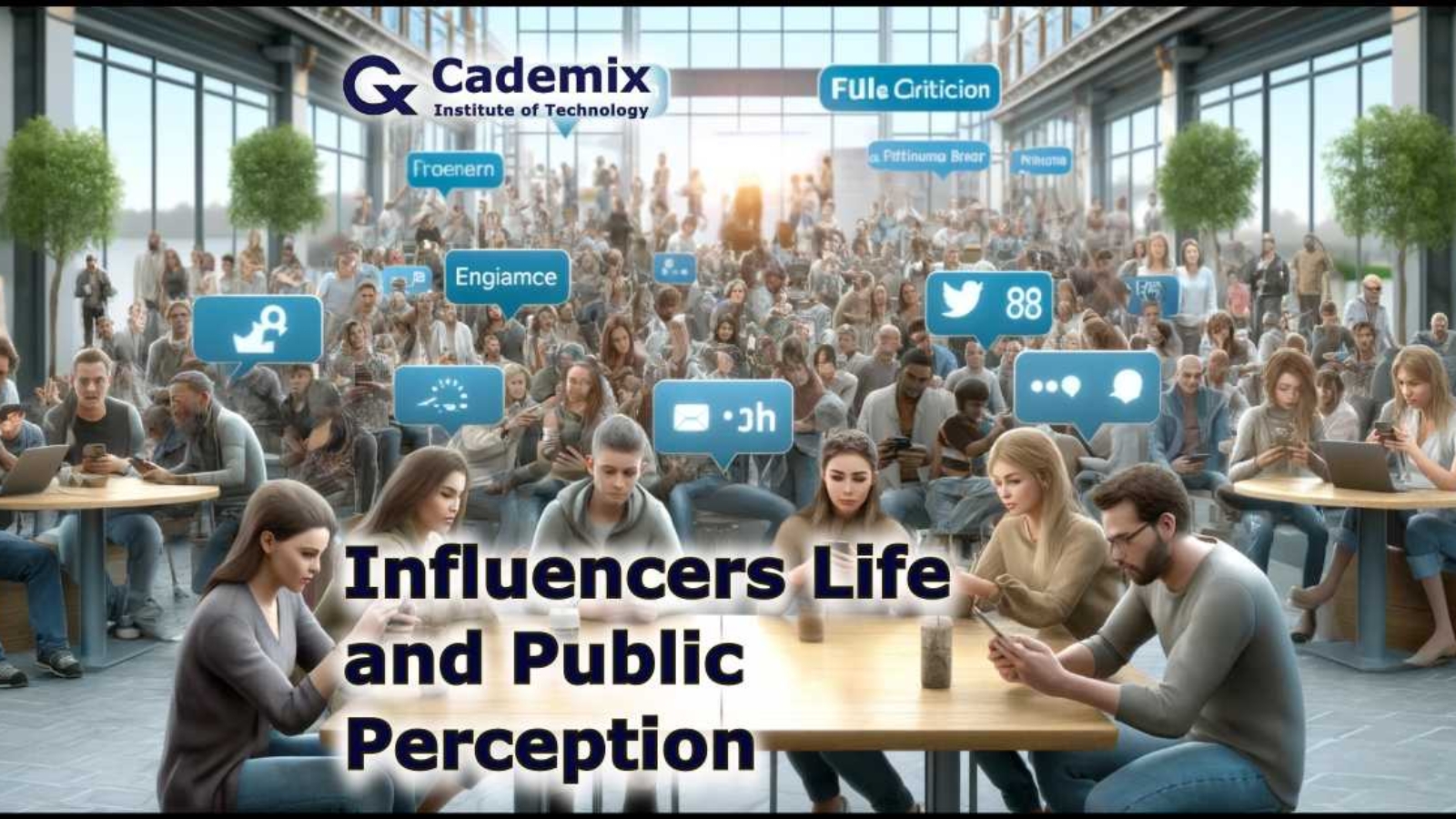In digital marketing’s dynamic landscape, influencers play a pivotal role, merging content marketing with personal branding to influence public perception and consumer behavior. This article explores the allure and reality of the influencer lifestyle, analyzing their ability to drive affiliate, lead, and network marketing through social media platforms. We examine the contrast between their public image and the behind-the-scenes effort, as well as the economic and ethical implications of influencer marketing. Through digital marketing strategies and case studies, we evaluate influencers’ impact on advertising agencies and marketing, providing insights into their sustainability in the online and SEO marketing landscape.
By Samareh Ghaem Maghami, Associate Technical and Interior Designer at Cademix Institute of Technology
Introduction
In the dynamic realm of digital marketing, the role of influencers has surged to the forefront, reshaping the way brands interact with their consumers. “Influencers”—a term that conjures images of social media savants and trendsetters—have become essential to marketing strategies, wielding their extensive reach to sway public opinion and consumer behavior. This article, “Behind the Scenes: The Life and Public Perception of an Influencer,” aims to peel back the curtain on the influencer lifestyle, revealing both the glamorous aspects celebrated in public and the less visible, often challenging realities that lurk behind the filtered scenes of social media.
Influencers are not merely content creators but are pivotal figures in the advertising world, engaging in complex strategies that involve content marketing, social media marketing, and affiliate marketing. Their ability to connect with large audiences makes them invaluable assets in lead generation and brand promotions, positioning them uniquely in the ecosystem of digital marketing jobs. This introduction sets the stage to explore why influencers have become so integral to marketing strategies, how they manage their public and private personas, and what the booming industry means for the future of digital communication. We will investigate the economic aspects of being an influencer, the ethical considerations, and the long-term sustainability of this career path in the context of evolving online marketing trends.

The Allure of Influencers
In today’s digital age, the fascination with influencers is more than just a cultural phenomenon—it’s a critical element of modern marketing strategies. But what is it about influencers that captures the public’s imagination and commands their attention? This section delves into the psychological allure and strategic importance of influencers in the digital marketplace.
Fascinated with Influencers
Humans are naturally drawn to charismatic individuals who exhibit confidence, success, and relatability. Influencers epitomize these traits, often presenting a lifestyle that many aspire to achieve. Through platforms like Instagram, YouTube, and TikTok, they share curated snapshots of their lives, creating a sense of connection and intimacy with their audience. This connection is powered by the human need for social interaction and belonging, making influencers not just relatable figures, but also aspirational symbols in the digital community.
Influencers in Advertising and Marketing
Beyond their appeal to basic human psychology, influencers are instrumental in shaping consumer behaviors and trends. Their recommendations can transform products from obscurities to must-haves overnight. In the realm of digital marketing, influencers contribute to a variety of strategies including:
- Content Marketing: By creating authentic and engaging content, influencers keep their audiences entertained and informed while subtly promoting products or services.
- Social Media Marketing: They leverage their extensive networks to increase brand visibility, driving both online and offline engagement.
- Affiliate Marketing: Many influencers earn revenue through affiliate links, which not only provide income for the influencer but also offer measurable metrics to marketing agencies to evaluate campaign effectiveness.
The strategic deployment of influencers allows brands to tap into established communities, ensuring that their marketing messages are not only heard but also trusted, thanks to the credibility that influencers work hard to maintain.
Economic Impact and Market Reach
The economic impact of influencers is significant, with influencer marketing becoming an essential line item in many companies’ marketing budgets. Influencers can reach niche markets with precision, thanks to their deep understanding of their audiences and effective use of digital marketing tools. This targeted approach, enhanced by SEO and online marketing techniques, ensures that marketing budgets are spent efficiently, yielding high returns on investment.
The allure of influencers lies in their dual role as both peers and promoters. They embody the convergence of personal connection and commercial appeal, making them a cornerstone of contemporary digital marketing strategies. As we explore the reality of the influencer lifestyle in the next section, it becomes clear why these digital personalities are not just popular but also powerful players in the marketing world.

The Reality of Being an Influencer
While the allure of being an influencer is undeniable, the reality involves much more than just glamorous events and sponsored posts. This section peels back the curtain to reveal the day-to-day life of influencers, discussing both the rewarding and challenging aspects of this unique career path.
Day-to-Day Challenges and Responsibilities
Contrary to popular belief, the life of an influencer is not all luxury and leisure. It involves a significant amount of hard work and dedication behind the scenes. Daily tasks typically include:
- Content Creation: Influencers spend considerable time planning, filming, editing, and promoting content across various platforms. This process can be highly time-consuming and requires consistent creativity and innovation to keep audiences engaged.
- Audience Engagement: Maintaining a strong connection with followers involves constant interaction through comments, direct messages, and live sessions, demanding significant time and emotional investment.
- Negotiations and Partnerships: Professional influencers often handle their own negotiations for partnerships and sponsorships, which requires business acumen and an understanding of marketing strategies.
Economic Viability
Being an influencer can indeed be lucrative, but income stability varies greatly. Influencers rely on multiple streams of revenue, including:
- Sponsored Content: Payments from brands for featured posts or videos.
- Affiliate Marketing: Commissions from sales are generated through links provided in their content.
- Merchandising: Some influencers launch their own product lines or merchandise, which can add a significant revenue stream.
However, these income sources can be inconsistent, and the pressure to maintain a certain level of fame and influence can lead to financial instability.
Ethical and Practical Considerations
The influencer profession also comes with its ethical dilemmas and practical challenges:
- Authenticity vs. Commercialization: Balancing genuine content with paid promotions is a tightrope walk, as audiences tend to value authenticity over overt commercialization.
- Privacy Concerns: The public nature of the job can lead to a lack of privacy and personal space, with influencers often sharing details of their personal lives as part of their brand.
- Market Saturation: The growing number of influencers makes it increasingly difficult to stand out, necessitating continuous innovation and adaptation.
Mental and Emotional Impact
The impact on mental health cannot be overlooked. Influencers often face online scrutiny, criticism, and even harassment, which can take a toll on their mental and emotional well-being. The pressure to maintain a certain image and constantly produce content can lead to burnout and stress.
In summary, while being an influencer can offer a high degree of visibility and potential financial rewards, it also involves significant challenges that require resilience, adaptability, and a keen understanding of both media production and marketing. The next section will explore how public perceptions shape the influencer’s role and their impact on society.

Public Perception and Criticism
Influencers wield significant influence over public opinion and consumer behavior, but they also navigate a landscape riddled with skepticism and criticism. This section explores the dual-edged nature of public perception concerning influencers, assessing both the positive impacts and the challenges they face from society at large.
The Good and The Bad
The public perception of influencers is often polarized. On one hand, they are seen as trendsetters and role models, driving social media marketing and content marketing to new heights. Their ability to connect personally with audiences contributes positively to their brands and the products they endorse.
- Trust and Relatability: Influencers often build a rapport with their audience that traditional marketing channels cannot, making them effective agents for lead generation and influencer marketing.
- Innovation in Marketing: They push the boundaries of digital marketing strategies, utilizing platforms like Instagram, YouTube, and TikTok to deliver content that resonates with the digital generation.
On the other hand, influencers can also face significant criticism:
- Over-commercialization: As the market becomes saturated with influencer promotions, there is growing concern about the authenticity of their endorsements. This skepticism can lead to a decline in the effectiveness of strategies like affiliate marketing and network marketing.
- Influence on Youth: The impact on younger audiences, who are highly impressionable, raises concerns about the values and lifestyles being promoted, particularly in regard to materialism and body image.
Ethical and Social Implications
Influencers operate in a realm where the lines between personal values and commercial interests often blur, which brings unique ethical challenges:
- Transparency and Disclosure: Regulations require clear disclosure of sponsored content, but adherence varies, impacting SEO marketing and trustworthiness.
- Cultural Impact: Influencers can both positively and negatively affect cultural norms and societal values, influencing everything from fashion choices to political opinions.
Criticism and Challenges
Criticism of influencers often stems from their perceived superficiality and the transient nature of their fame:
- Sustainability Concerns: Questions arise about the long-term sustainability of the influencer marketing model, especially within digital marketing agencies and among marketing professionals.
- Privacy and Mental Health: The pressure to maintain a curated image and the constant scrutiny by the public can lead to significant personal challenges, including issues related to mental health and well-being.
Impact on the Marketing Industry
The role of influencers continues to evolve within the advertising agency sector and broader marketing strategies. Their ability to adapt and respond to criticism by aligning more closely with values like transparency and authenticity will likely dictate their future role and effectiveness.
- SEO Marketing: Influencers who effectively manage their SEO through smart content strategies can maintain a robust online presence, ensuring their continued relevance in the digital marketing landscape.
- Evolution of Digital Marketing: As digital marketing evolves, influencers must navigate changing algorithms, platform dynamics, and audience preferences to stay relevant.
In conclusion, while influencers play a pivotal role in shaping modern marketing and cultural landscapes, they must navigate complex challenges and criticisms that affect not only their personal lives but also their professional efficacy. The next section will delve deeper into the mechanisms behind their fame and the strategies they employ to remain at the forefront of the digital economy.

Influencers and Fame
The pathway to fame for influencers is often as much about strategic marketing as it is about charisma and content. This section examines the mechanics behind how influencers gain fame and maintain their status in the competitive world of social media marketing.
Mechanics of Viral Marketing
The rise of an influencer often hinges on their ability to create viral content. This involves a deep understanding of digital marketing, especially SEO marketing, which helps in optimizing content for maximum visibility and engagement.
- Content Strategy: Effective influencers craft their content based on thorough keyword research, trending topics, and SEO principles to boost their visibility in search engine results.
- Engagement Tactics: Techniques such as engaging directly with followers, hosting live streams, and collaborating with other influencers are crucial for building and maintaining an active community.
Leveraging Social Media Platforms
Influencers utilize a variety of social media platforms to amplify their reach and influence. Each platform serves a different purpose in the influencer’s marketing strategy:
- Instagram: Ideal for high-quality visuals and stories, Instagram supports affiliate marketing through shoppable posts and direct promotions.
- YouTube: As a platform for longer-form content, YouTube allows influencers to delve deeper into topics, supported by sophisticated video SEO techniques.
- TikTok: Known for its viral potential, TikTok favors short, catchy videos that can quickly gain traction and lead to rapid audience growth.
Strategic Brand Partnerships
Collaborations with brands are crucial for influencers looking to monetize their fame. These partnerships are a core part of influencer marketing and involve detailed marketing strategies to ensure mutual benefit.
- Sponsored Content: Influencers must balance the promotion of products while maintaining the trust of their audience, making transparency about sponsorships vital.
- Exclusive Deals: Some influencers sign exclusive deals with marketing agencies or brands, which can provide more stable income but may limit their freedom to engage with other sponsors.
Audience Relationship and Community Building
The relationship between influencers and their audiences is foundational to their success. This connection is built on authenticity and consistent engagement, which drives online marketing and community loyalty.
- Community Engagement: Regular interaction with followers through comments, personalized content, and responding to feedback helps solidify this bond.
- Trust and Credibility: Building trust through consistent and honest communication is essential for sustained influence and effectiveness in lead generation.
Case Studies: Paths to Influence
Highlighting specific case studies of successful influencers provides insights into the varied paths one can take to achieve fame in the digital arena. These examples also illustrate the application of diverse marketing jobs and strategies, from digital marketing agencies to solo content creators leveraging network marketing.
In short, influencers attain and sustain fame by mastering the interplay between content creation, strategic marketing, and genuine community engagement. The tools and platforms at their disposal allow them to reach vast audiences, but it is their strategic use of these resources that ultimately secures their place in the limelight. The final section will reflect on these dynamics to conclude our exploration of the influencer phenomenon.
Conclusion
As we have explored throughout this article, the role of influencers in digital marketing and modern culture is multifaceted and impactful. Influencers not only shape consumer behavior and trends but also drive significant advancements in the marketing industry through their unique blend of personal branding and strategic content creation. This final section summarizes the key impacts of influencers and reflects on the sustainability of the influencer lifestyle and business model.
Impact on Digital Marketing and Consumer Culture
Influencers have become integral to digital marketing strategies across various industries. By leveraging tools like SEO marketing, content marketing, and social media marketing, they have transformed how brands connect with consumers, making marketing efforts more personalized and direct.
- Influence on Consumer Decisions: Influencers have the power to sway public opinion and affect purchasing decisions, significantly impacting the effectiveness of online marketing and advertising strategies.
- Advancements in Marketing Techniques: The need to optimize influencer campaigns has led to innovations in digital marketing tools and techniques, enhancing capabilities in areas such as lead generation and data analytics.
Sustainability of the Influencer Model
While the influencer model has proven effective, questions remain about its long-term viability:
- Market Saturation: As more individuals attempt to become influencers, the space becomes increasingly competitive, requiring continuous innovation and adaptation.
- Changes in Consumer Sentiment: The authenticity of influencer promotions can sometimes be questioned, potentially leading to influencer fatigue among consumers. This requires influencers to maintain high levels of transparency and genuine engagement.
The Future of Influencers in Marketing
Looking forward, the role of influencers is likely to evolve in response to changing technologies and consumer expectations. Influencers who adapt by enhancing their content quality and engagement strategies while aligning with ethical marketing practices are more likely to sustain their relevance and effectiveness.
- Integration with Emerging Technologies: Innovations such as artificial intelligence and virtual reality may offer new platforms and tools for influencers to engage their audiences.
- Focus on Niche Markets: Specializing in specific niches can help influencers maintain a loyal following and offer more targeted marketing opportunities for brands.
For those involved in digital marketing, whether as brands, marketers, or aspiring influencers, it is crucial to remain vigilant about the trends shaping this landscape. Engaging with influencers thoughtfully and ethically will not only enhance brand presence but also contribute to a more authentic and sustainable marketing environment.
In conclusion, influencers are more than just social media stars; they are pivotal contributors to the digital economy, shaping how brands interact with consumers and how products are marketed in the 21st century. As this dynamic field continues to evolve, so too will the strategies and impacts of those who wield influence online.

About the Author
Samareh Ghaem Maghami, skilled in interior decorating and event management, is currently pursuing a master’s in eco-design in Austria. With a diverse cultural background, she brings a unique perspective to her work, blending aesthetics with sustainability. Her experiences in design and content creation, coupled with her passion for painting and nature, enhance her approach to eco-friendly design and marketing. Connect with Samareh on LinkedIn for collaboration and insights into eco-design and digital marketing.
She is also an Associate Technical and Interior Designer at Cademix Institute of Technology and a member of the Cademix Career Autopilot Program.
Please feel free to contact her under:
E-mail: sam.gh.maghami@gmail.com
E-mail: samareh.ghaem-maghami@cademix.org
LinkedIn: https://www.linkedin.com/in/samareh-ghaem-maghami
Xing: https://www.xing.com/profile/Samareh_GhaemMaghami

